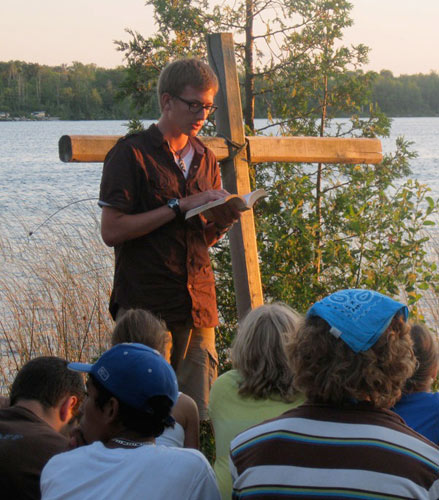“I’m a better person when I get home from camp.”
The quote was recently shared with me by Reed’s father. I was struck by this statement and have pondered it, turned it around in my mind, and compared it to my own experience with Silver Lake, in an attempt to understand and explain it. Why is it that so many campers and counsellors report coming away from camp with a deeper sense of being grounded and connected to themselves, their peers and to God?
Last summer, David Csinos, an author, speaker, practical theologian, researcher of children’s spirituality and former children’s pastor, joined the staff during orientation to discuss issues of spirituality and the emerging church. He explored the Celtic notion of “thin places,” where the space between us and God is thinner. For most people, these thin places are found in nature.
If you look for some biblical roots of this notion, they aren’t obvious or easy to find. The contemporary experience of a world divided up into certain locales, some of which are easier than others to connect with God from, is likely far from what God had in mind with the creation story in the book of Genesis.
Eden, representing the entire created world, was a thin place. God was everywhere: in the trees, the air, the earth and the water. If it’s true that most people find their thin place in nature, then as we’ve divided and developed Eden is it any wonder people have lost their faith, their connectedness to God?
For most of us, it’s difficult to find thin places when the computer monitor is always on, an endless string of sticky notes are pasted across the desk, the calendar is full, the window looks out on a few trees and plenty of concrete, and the weather is far from any historical norm. Like Adam and Eve, we’ve corrupted Eden and, in doing so, have limited or, at the very least, hindered our connectedness with God.
So let’s flip this around. Perhaps we should not think of thin places in a limited way to describe just a few of those locales where God is nearer to us. Rather, let’s consider what it would be like to take a “thin place” approach to all of life.
If we were to become less thick, we might be able to perceive God’s presence not only in a few places, but in all of life. Perhaps this is what Reed and others experience at camp. Perhaps camp is a thin place where they can find God in the trees of the Enchanted Forest and the algae at the frog pond, in the tastiness of a wild raspberry, or in the harmony of a song at the campfire.
Specifically, perhaps camp is a place where Reed can be more truly Reed, free from busy schedules, away from concrete—except the basketball court—and disconnected from TVs, computers, cell phones and other electronic devices. At camp we disconnect from the material world and reconnect to the spiritual world, and in doing so connect more easily to God.
Thin places are good! Camp is a thin place to certain people for certain reasons. Perhaps if we take time to consider what makes certain places thin, we will be inspired to seek out and create more thin places for us and our children where, like Reed, we can all be better people.
Originally published in the Fall 2012 edition of Silver Lake Mennonite Camp’s ‘Woodbox Newsletter.’









Leave a Reply
You must be logged in to post a comment.